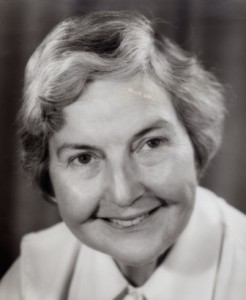Mary Andrews
(1915 - 1996)
 Mary Andrews was born in 1915 at Dry Plain Station near Cooma in NSW. She later moved to Sydney and had a varied career as a psychiatric nurse, a Bible college student, a student deaconess and a part time assistant in several Sydney parishes and unemployment camps. From a young age, Mary Andrews had a desire to serve God in China. In 1938 she joined the Church Missionary Society and sailed for Peking, where she studied in the College of Chinese Studies until the outbreak of war. At one point she was forced to escape from the Japanese invasion of China.
Mary Andrews was born in 1915 at Dry Plain Station near Cooma in NSW. She later moved to Sydney and had a varied career as a psychiatric nurse, a Bible college student, a student deaconess and a part time assistant in several Sydney parishes and unemployment camps. From a young age, Mary Andrews had a desire to serve God in China. In 1938 she joined the Church Missionary Society and sailed for Peking, where she studied in the College of Chinese Studies until the outbreak of war. At one point she was forced to escape from the Japanese invasion of China.
In 1939 Mary was appointed to the district of Lin Hai in Chekiang. There she conducted a school for poor children, while continuing her studies. During this time, continual attacks from the Japanese made life dangerous and uncertain. A highlight of this period for Mary was nursing Captain Ted Lawson, war hero and author of the book Thirty Seconds Over Tokyo.
Mary was again forced to escape the Japanese advance into China, this time by trekking across the Himalayas into India. In India, she took up work at St Faith’s Children’s Home in Lahore, and at a home for destitute women and girls. After a brief return to Sydney, Mary went back to her beloved China in 1947, where she brought many to know Jesus. These Christians eventually grew into a very large congregation.
Mary was again forced to leave China in 1951 after the Communist Party came into power. When it became obvious that mission work in China was no longer possible, Mary returned to Sydney and was appointed as the Head Deaconess of the Anglican Diocese of Sydney.
In 1952, Archbishop Howard Mowll convinced a reluctant Mary Andrews to consider becoming the Principal of Deaconess House with the vision that, under good leadership, the college could ‘become a training place from which women will go to the farthest parts of the world equipped to serve God’. Indeed, many women who trained under her went on to serve God in Sydney and throughout the world. Mary served as Principal for twenty-three years until 1975. While in semi-retirement, Mary became chaplain at three retirement villages and served on countless local and overseas committees, councils and international bodies. She was presented with the Order of Australia Medal (AM) by the Queen in 1980 for her contribution to the church and Australia. Deaconess Mary Andrews was a woman who deeply loved God and served him faithfully until her death in 1996. In 1997 Deaconess House was renamed Mary Andrews College in her honour.